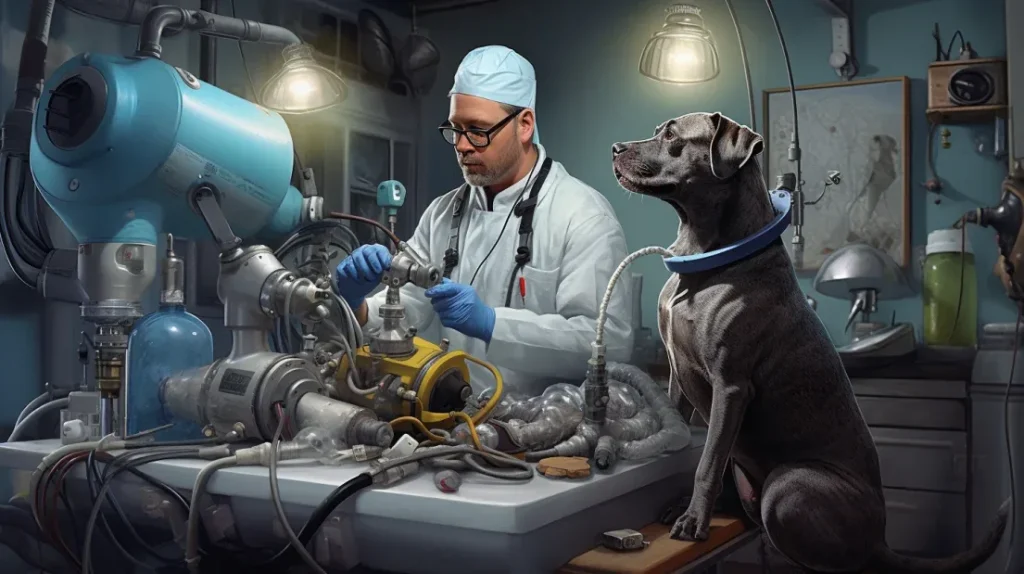Are you aware of the potential dangers grapes can pose to your beloved pup? You must be informed about the hazards certain foods can present to your furry friend.
One danger is the toxicity of grapes, which can seriously harm your dog’s health. In this article, we’ll introduce you to the grape toxicity in dogs calculator, a tool that can help you determine the potential toxicity level of a grape or raisin incident.
By understanding grape toxicity in dogs, you can take proactive measures to protect your pup.
Key Takeaways
- Raisins can be highly toxic to dogs, and it is best to avoid feeding them to your pet.
- Symptoms of raisin poisoning in dogs include vomiting, diarrhea, lethargy, abdominal pain, and dehydration.
- Kidney failure can occur within 24-72 hours of ingestion and can be fatal in most cases.
- Immediate veterinary care is necessary if your dog consumes raisins to prevent further complications and potential fatality.
What Is the Grape Toxicity Calculator?
The Grape Toxicity Calculator is a valuable tool for dog owners to assess the potential risk of grape ingestion in their pets. Developed by experts, this calculator considers factors such as the dog’s weight, the amount of grapes consumed, and the dog’s overall health status to estimate the level of toxicity.
Grapes, whether fresh or dried, can be toxic to dogs and may cause acute kidney failure. Symptoms can include loss of appetite, vomiting, diarrhea, and lethargy. Severe cases can lead to kidney damage and life-threatening renal failure.
Even a single grape can be toxic, so it’s crucial to keep grapes and raisins out of your dog’s reach. If you suspect your dog has ingested grapes, seek immediate veterinary attention. The Grape Toxicity Calculator can provide valuable information to your vet to determine appropriate treatment options, such as fluid therapy, to support kidney function and prevent further damage.
Remember, educating yourself about other dog food hazards, such as chocolate and macadamia nuts, is essential for your pet’s overall well-being. Regular dental care and avoiding harmful substances are also necessary.
How Does It Work?
The Grape Toxicity Calculator is a valuable tool that helps veterinarians determine the appropriate treatment for dogs who have ingested grapes or raisins. Grapes can emit harmful substances that damage the kidneys and cause renal failure in dogs.
The calculator considers dog weight, grape or raisin intake, and time since ingestion. These factors help determine the level of toxicity and guide treatment decisions.
Immediate veterinary attention is essential if you suspect your dog has ingested grapes. Using the Grape Toxicity Calculator, your vet can assess the severity of the situation and provide appropriate care, such as fluid therapy, to support kidney function and prevent further damage.
Remember, even a single grape can be toxic to dogs, so it’s crucial to keep grapes and raisins out of your dog’s reach. The Grape Toxicity Calculator is an invaluable tool in ensuring the health and safety of your beloved pet.
Understanding Grape Toxicity in Dogs Calculator
Grapes and raisins may seem harmless, but they can be toxic to our furry companions, especially dogs. It’s essential to be aware of the risks associated with grape and raisin ingestion to keep our pets safe.
The toxic components in grapes and raisins are still unknown, but ingestion can lead to severe signs such as vomiting, diarrhea, and loss of appetite. In some cases, it can even cause acute kidney failure, which can be life-threatening for our pets.
If you suspect your dog has ingested grapes or raisins, it’s crucial to seek immediate veterinary care. Your veterinarian may induce vomiting to remove the toxic substance from the body, or they may administer activated charcoal to prevent further absorption. Fluid therapy may also be necessary to support kidney function and promote urine production.
Prevention is vital when it comes to grape and raisin toxicity. Keep these foods, even in small quantities, out of your dog’s reach. It’s also important to educate yourself about other potentially toxic foods and substances that can harm your pets.
Remember, the best way to protect your pup is to be proactive. By being vigilant about what they have access to, you can help ensure their safety and well-being.
Factors Affecting Grape Toxicity

To fully comprehend the factors that contribute to grape toxicity in dogs, let’s explore what determines the level of danger these fruits pose to our furry friends.
Factors affecting grape toxicity:
- Toxic dose: The toxic dose of grapes for dogs is influenced by the amount of grapes ingested. The lowest reported poisonous dose for grapes is 0.7 oz/kg. Dogs would have to eat 4.2 ounces of grapes to reach the toxic amount.
- Tartaric acid levels in grapes: Grapes contain high concentrations of tartaric acid, identified as a potential toxic component. The presence of tartaric acid can contribute to the severity of grape toxicity in dogs.
- Size of the dog: The dog’s size also plays a role in grape toxicity. Smaller dogs may be more susceptible to adverse reactions due to lower body weight and metabolism.
Understanding these factors is essential in assessing the potential danger of dog grape ingestion.
Now, let’s delve into the symptoms of grape toxicity in dogs.
Symptoms of Grape Toxicity in Dogs

- Grape toxicity in dogs can lead to a range of symptoms that indicate potential health issues. Common symptoms include vomiting, diarrhea, abdominal pain, and lethargy.
- Other signs may include increased thirst, decreased appetite, and changes in urination.
- It’s crucial to monitor your dog for any symptoms of grape toxicity and seek veterinary care if necessary. Prompt treatment can help prevent complications and ensure the best outcome for your furry friend.
- Common Symptoms Associated With Grape or Raisin Toxicosis in Dogs
- Grape or raisin toxicosis in dogs can cause various symptoms that pet owners should be aware of.
- However, it’s important to note that not all dogs will show symptoms immediately after ingesting grapes or raisins. Some may appear fine initially but develop severe signs of poisoning within 24 hours.
- One of the severe complications of grape or raisin toxicosis is acute kidney failure. This can lead to a decrease in urine production and output, as well as increased thirst. Other signs may include weakness, lethargy, and abdominal pain.
Remember, early intervention and treatment are crucial in preventing further kidney damage and ensuring the pet’s well-being.
Prompt Treatment and Prognosis
Seek immediate veterinary care if your dog exhibits symptoms of grape toxicity, such as vomiting, diarrhea, abdominal pain, lethargy, increased thirst, and decreased appetite. These symptoms can indicate poisoning and require prompt treatment.
It’s essential to consult a veterinarian who can assess the situation and provide appropriate care. Using a grape toxicity calculator can help determine the potential level of toxicity and guide the veterinarian in formulating a treatment plan.
The prognosis for dogs with grape toxicity depends on the amount ingested and the promptness of treatment. Timely intervention can prevent complications and ensure the best outcome for your dog. However, it’s also important to consider other potential causes of these symptoms, such as changes in diet, infections, or underlying health conditions.
If the symptoms persist or worsen, it’s recommended to have your dog checked by a veterinarian for further evaluation.
Other Potential Causes
To identify other potential causes of symptoms in dogs, a thorough examination by a veterinarian is crucial. While grape or raisin poisoning can cause symptoms such as vomiting, diarrhea, abdominal pain, and lethargy in dogs, it’s essential to consider other factors that may contribute to these symptoms.
Here are three possible causes to consider:
- Changes in diet: Dogs can experience gastrointestinal upset when their diet is suddenly altered. If your dog is experiencing diarrhea after eating grapes, the symptoms may be unrelated to the grape ingestion and caused by a change in their food.
- Other food items: Dogs can have sensitivities or allergies to certain foods. Symptoms after grape ingestion could result from a reaction to another food item consumed around the same time.
- Underlying health conditions: Dogs with pre-existing health conditions may be more susceptible to gastrointestinal issues. It’s essential to consider any underlying health conditions that could contribute to the symptoms observed after grape ingestion.
If your dog is experiencing persistent or worsening symptoms, it’s recommended to consult a veterinarian for a comprehensive evaluation.
Introducing the Grape Toxicity Calculator
Introducing the Grape Toxicity Calculator: A Tool to Protect Your Dog
As dog owners, we want to keep our furry friends safe and healthy. We know that certain foods can be harmful to dogs, and one such food is grapes. Grapes, fresh or dried, can poison dogs and cause major health issues.
To help dog owners understand the potential risks of grape ingestion and take the necessary precautions, a team of experts has developed the Grape Toxicity Calculator. This unique tool is designed to estimate the level of toxicity in dogs based on various factors such as the dog’s weight, the amount of grapes consumed, and the dog’s overall health status.
The Grape Toxicity Calculator considers the toxic components found in grapes, which can cause acute kidney failure in dogs. Some dogs may experience symptoms such as loss of appetite, vomiting, diarrhea, and lethargy. In severe cases, dogs may develop kidney damage, leading to decreased urine output and potentially life-threatening renal failure.
By using the Grape Toxicity Calculator, dog owners can quickly assess the potential risk based on their dog’s individual information. This enables them to make informed decisions and seek prompt veterinary care.
It’s important to remember that even a single grape or raisin can be toxic to dogs, and the severity of the toxicity can vary depending on the dog’s size and other factors. Therefore, it’s essential to keep grapes and raisins out of your dog’s reach and be vigilant about checking for accidental ingestion.
If you suspect that your dog has consumed grapes or raisins, it’s crucial to seek immediate veterinary attention. The Grape Toxicity Calculator can provide valuable information to your veterinarian, enabling them to determine appropriate treatment options, such as fluid therapy, to support kidney function and prevent further damage.
In addition to using the Grape Toxicity Calculator, it’s essential to educate yourself about other potential food hazards for dogs. Foods like chocolate, macadamia nuts, and certain sweeteners can also harm our canine companions. Regular dental care and avoiding harmful substances like cream of tartar are also vital for maintaining their overall well-being.
By using tools like the Grape Toxicity Calculator and being diligent about what foods we allow our dogs to consume, we can protect them from potential harm and ensure their long and healthy lives.
Clinical Signs Indicative of Grape or Raisin Toxicosis in Dogs
Dogs with grape or raisin toxicosis may show different symptoms depending on the amount eaten. Loss of appetite is a common symptom, along with vomiting and diarrhea. Dogs may also exhibit abdominal pain, such as restlessness or discomfort.
One of the more severe signs of grape or raisin toxicosis in dogs is the development of acute kidney failure. This can lead to increased drinking and urination, as well as decreased urine production and output. Other signs of kidney damage may include changes in behavior or activity levels, lethargy, and pale gums.
If your dog ate raisins or grapes, take him to the vet. Induce vomiting, provide activated charcoal to absorb toxins, and provide supportive care such hydration treatment and renal function monitoring.
While the grape toxicity calculator can help assess the potential toxicity, it is not a substitute for veterinary care.
Loss of Appetite
One common symptom of grape or raisin toxicosis in dogs is a loss of appetite. If your pup has ingested grapes or raisins and is suddenly uninterested in eating, it could be a sign of toxicity. This lack of appetite may be accompanied by other clinical symptoms such as vomiting, diarrhea, and abdominal pain.
Appetite loss can cause nutrient deficiencies and weight loss. Your dog may be losing weight after eating grapes or raisins. Take him to the vet.
The veterinarian may thoroughly examine and recommend treatment options based on your dog’s condition. To eliminate residual poisons, vomiting or activated charcoal may be needed.
Acute Kidney Failure
Grapes and raisins can cause acute kidney failure in dogs. This severe condition necessitates prompt veterinary care. Grapes and raisins contain harmful ingredients that can damage the kidneys and reduce renal function.
One common symptom of acute kidney failure in dogs is a loss of appetite. This can be concerning as it can result in nutrient deficiencies and weight loss. Other signs of kidney failure may include decreased urine production or output, increased thirst, and changes in behavior.
If you suspect your dog has ingested grapes or raisins and is showing signs of acute kidney failure, it is crucial to seek veterinary care right away. The veterinarian may recommend fluid therapy to support kidney function, monitor blood pressure, and provide supportive care. Early intervention is vital in preventing further kidney damage and improving the chances of recovery.
Reduced Urine Production
Reduced urine production is a common symptom of grape toxicity in dogs. If your pup has ingested grapes or raisins and is showing this sign, it is essential to take immediate action. Reduced urine production can indicate kidney damage, which can lead to acute kidney failure if left untreated.
Seek veterinary attention right away if you notice your dog’s urine output has decreased. The veterinarian may recommend fluid diuresis to help flush out the toxic components and support kidney function. This involves intravenous fluid therapy to maintain hydration and improve urine production.
Early intervention is crucial in preventing further kidney damage and increasing the chances of recovery. The vet may also monitor blood pressure and provide supportive care to ensure your dog’s well-being.
High Blood Pressure
Hypertension, or high blood pressure, is common in dogs and can be dangerous if untreated. It is essential to recognize the signs of high blood pressure in your pup and seek veterinary care promptly.
High blood pressure in dogs can cause appetite loss, weakness, nosebleeds, and eyesight problems. A vet should examine your dog’s blood pressure if you observe any of these signs.
Kidney and cardiac failure can result from untreated hypertension. In dogs with pre-existing kidney disease, high blood pressure can further impair kidney function and worsen the condition.
Treatment for high blood pressure in dogs typically involves medication and lifestyle changes. In addition, your vet may recommend dietary modifications, exercise, weight management, and stress reduction techniques.
Abnormalities in Kidney Function Tests
Abnormalities in kidney function tests can provide valuable information about your dog’s overall kidney health. These tests evaluate vital indicators, such as creatinine and blood urea nitrogen (BUN) levels, to assess the kidneys’ ability to filter waste and maintain proper fluid balance.
Elevated creatinine and BUN levels can indicate impaired kidney function, which various factors, including kidney disease, infections, or certain medications, may cause. Conversely, low levels of these markers may suggest excessive fluid intake or early-stage kidney disease.
Other abnormalities in kidney function tests may include abnormal levels of electrolytes, such as potassium, calcium, and phosphorus. Imbalances in these electrolytes can affect many bodily functions and may indicate kidney dysfunction.
If your dog’s kidney function tests show abnormalities, it is crucial to consult your veterinarian for further evaluation and treatment.
Treatment for Grape Toxicity in Dogs

When it comes to grape toxicity in dogs, prompt treatment is crucial. Suppose your dog has ingested grapes and is showing symptoms such as vomiting, diarrhea, abdominal pain, lethargy, increased thirst, decreased appetite, or changes in urination. In that case, it’s essential to seek emergency veterinary care.
The prognosis for dogs with grape toxicity depends on the amount ingested and the promptness of treatment.
Emergency Veterinary Care
If your dog has ingested grapes and is showing symptoms of grape toxicity, it’s essential to take them to an emergency veterinary care facility immediately. Delaying treatment can cause serious problems and death.
Here are three reasons why emergency veterinary care is crucial in cases of grape toxicity in dogs:
- Prompt intervention: Emergency veterinary care ensures your dog receives immediate medical attention. The veterinarian will assess your dog’s condition, perform necessary diagnostic tests, and initiate appropriate treatment to mitigate the effects of grape toxicity.
- Expert guidance: Emergency veterinarians are trained to treat grape intoxication in dogs. They can provide specialist advice on the best action and tailor the treatment plan to your dog’s needs.
- Access to resources: Emergency veterinary clinics have advanced diagnostic equipment, drugs, and fluids. These resources are crucial in managing grape toxicity and supporting your dog’s recovery.
Taking your dog to an emergency veterinary care facility ensures they receive the prompt and comprehensive treatment they need to overcome grape toxicity. Remember, time is of the essence in these situations, so seek medical help without delay.
Frequently Asked Questions
Can Grapes Be Toxic to All Breeds of Dogs?
Grapes can be toxic to all breeds of dogs. The toxic dose for grapes is 0.7 oz/kg, so it would take 4.2 ounces to reach an unhealthy level. It’s important to avoid feeding grapes to dogs to prevent potential toxicity.
Is There a Specific Type of Grape That Is More Toxic to Dogs?
No, there isn’t a specific type of grape that is more toxic to dogs. All grapes, regardless of their variety, can be harmful. It’s best to avoid feeding grapes to your dog to prevent any potential toxicity.
Are There Any Long-Term Effects of Grape Toxicity in Dogs?
Long-term effects of grape toxicity in dogs can include kidney damage, which may lead to chronic kidney disease. It is crucial to seek prompt veterinary care to minimize the risk of long-term complications for your pup.
Can Grape Toxicity in Dogs Be Reversed With Treatment?
Yes, treatment for grape toxicity in dogs can help reverse the effects. Prompt veterinary care is crucial for inducing vomiting, administering activated charcoal, providing IV fluids, and offering supportive care to increase the chances of a positive outcome for your dog.
Are There Any Natural Remedies or Home Treatments for Grape Toxicity in Dogs?
There are no proven natural remedies or home treatments for dog grape toxicity. Your dog must see a vet immediately if it ate grapes. Prompt treatment prevents problems and improves outcomes.
What substances in grapes are toxic to dogs?
The exact substances in grapes that are toxic to dogs are not yet fully understood. Research suggests it may be related to compounds like resveratrol and tannins found in grapes and raisins, but the specific toxin remains unidentified.
Can you explain what makes grapes toxic for dogs?
The exact mechanism by which grapes are toxic to dogs is still unclear. In some cases, ingestion of grapes or raisins can lead to kidney failure, but the reason for this reaction is not well-defined. Dog owners must be cautious and avoid feeding grapes and raisins to their pets.
How does the ASPCA describe grape toxicity in dogs?
The ASPCA describes grape toxicity in dogs as potentially causing kidney failure. The specific toxic component in grapes remains unidentified, making it essential to prevent dogs from consuming them.
How long does grape toxicity last in dogs once it occurs?
The duration of grape toxicity in dogs varies depending on the quantity consumed and the dog’s sensitivity. Kidney damage may occur within hours of ingestion, and recovery or progression to severe kidney failure can happen over several days. Immediate veterinary care is crucial to mitigate the effects and improve the prognosis.
Conclusion
In conclusion, the Grape Toxicity Calculator is an essential tool for dog owners to determine the potential danger of grapes and raisins. By understanding the factors contributing to grape toxicity and recognizing the symptoms, you can take prompt action to protect your beloved pup.
Remember, prevention is vital in keeping your dog safe, so keep grapes and raisins out of their reach. Stay informed and keep your furry friend healthy and happy.
Remember, an ounce of prevention is worth a pound of cure.
Quick Paw Note: While we’re passionate about providing helpful pet nutrition content, it’s essential to remember that this info isn’t a substitute for professional veterinary advice. Always consult your vet for your pup’s specific dietary needs. We strive for accuracy, but paw-lease note that we can’t guarantee the complete reliability of all content. Stay pawsome! 🐾




